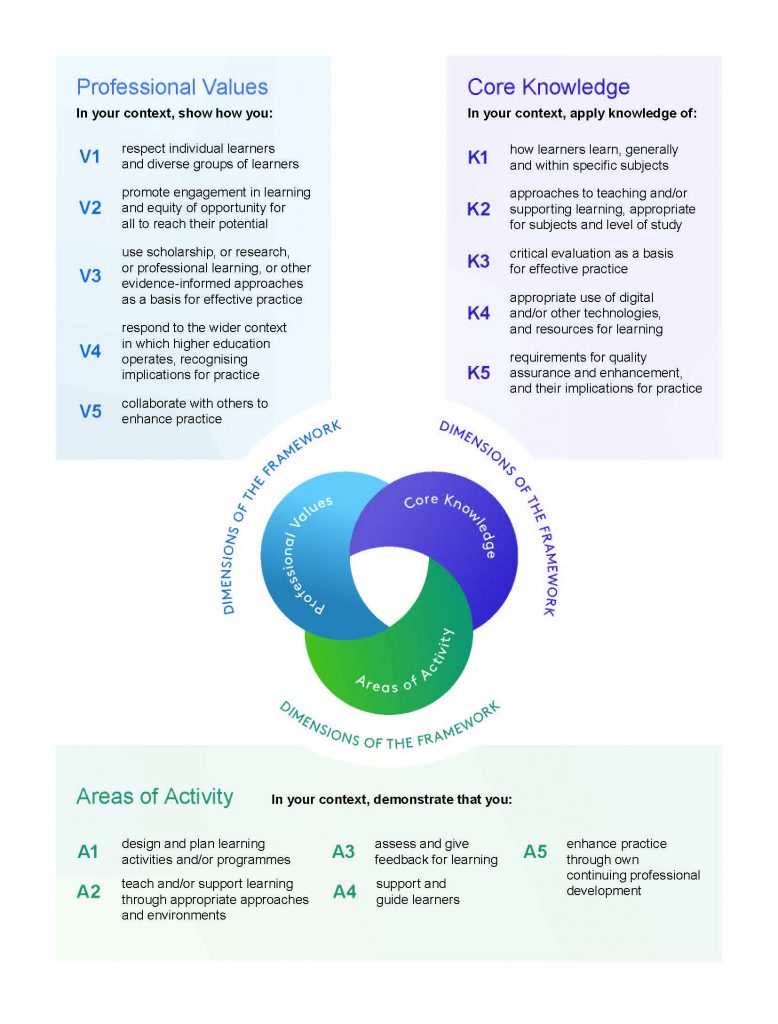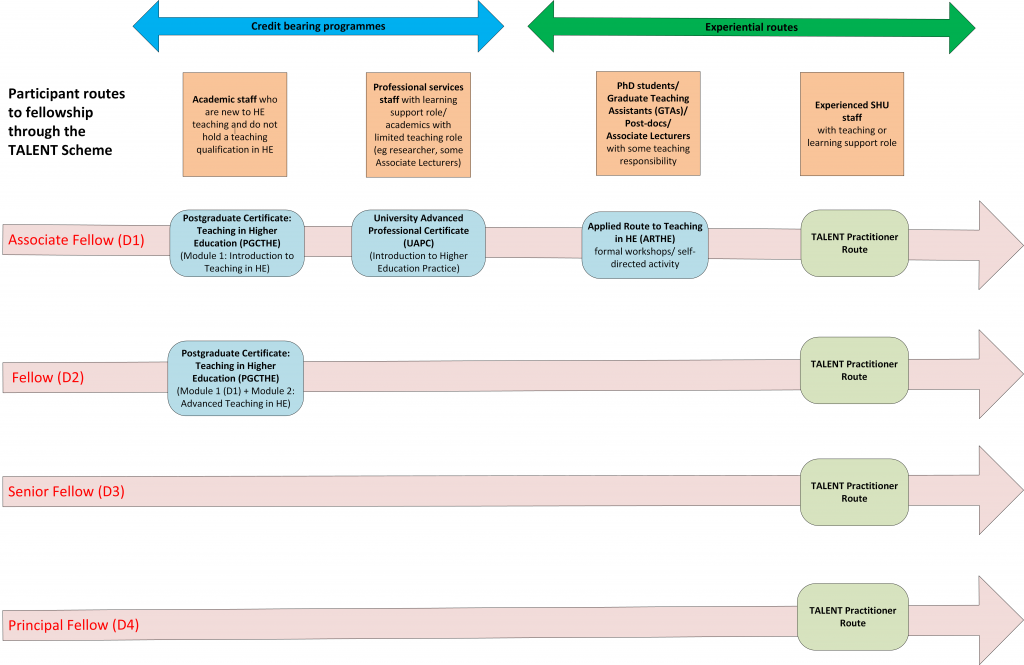ABOUT FELLOWSHIP
What is Fellowship?
Advance HE Fellowship is an indicator of professional achievement for higher education practitioners. It confers the right to use the titles Associate Fellow, Fellow , Senior Fellow and Principal Fellow.*
Fellowship is achieved by demonstrating how your practice in teaching and/or supporting learning in HE meets the criteria laid out within the Professional Standards Framework (PSF 2023) which consists of two components: Descriptors and Dimensions.
The Descriptors are a set of criteria statements. These define the key characteristics of four broad categories of practice as above (D1- D4). Incorporating the Dimensions, each Descriptor identifies the extent of practice required to meet it and recognises the variety of practice and roles undertaken by professionals who teach and/or support learning. Each Descriptor consists of an introduction and a set of three criteria statements, which are detailed in each of the Categories of Fellowship.
The Dimensions of the Framework are arranged as three related sets of five Professional Values, five forms of Core Knowledge and five Areas of Activity.
- Professional Values (V1-5): underpin all forms of Core Knowledge and Areas of Activity. They are the foundation of professional practice.
- Core Knowledge (K1-5): informed by the Professional Values, representing key forms of knowledge required to undertake the Areas of Activity. There are multiple and diverse forms of knowledge which are connected to and shaped by communities and contexts.
- Areas of Activity (A1-5): bring together the Professional Values and forms of Core Knowledge, showing the essential activities that support delivery of effective practice.
Click on the image below to enlarge and download
What are the benefits of Fellowship?
Fellowship is highly valued at Sheffield Hallam University. It is a sought-after qualification, is included on the academic role person specification as an essential (non-removable) requirement, with Senior Fellowship being a desirable criterion for Principal Lecturer appointments, and forms a significant part of the Learning & Teaching strand of the Academic Careers Framework. It is also valued nationally as a professional qualification by universities and colleges who collectively established the Professional Standards Framework (PSF 2023) on which recognition is based. There are now over 170,000 HE practitioners with one or other of the fellowship categories and there is a rapidly growing international recognition of fellowship as a badge of teaching quality.
Most practitioners who have gained recognition have found it to be an important reflective process. It has increased their confidence in what they do by formally recognising its quality and appropriateness.
“It is a developmental process that increases confidence, which is so important to feel and for students to see. It helps to align the University’s commitment to teaching quality.”
“Reflecting on practice is a good way to highlight and challenge assumptions.”
For an individual it demonstrates your professionalism and promotes the ethos of an academic community of practice.
For a course team it allows them to evidence the quality of teaching on the course and shows the team’s commitment to enhancing the quality of the student experience.
For an institution it showcases the University’s teaching quality and its support for the professional development of its staff. The statistics related to this can be used by the institution to satisfy Office for Students (OfS) requirements and support Teaching Excellence Framework (TEF) submissions.
For the sector it demonstrates the quality and maturity of its teaching standards and its investment in maintaining the value of a UK higher education, nationally and internationally.
*The Higher Education Academy (HEA) became part of Advance HE in 2018. The post-nominals that have been in use (AFHEA, FHEA, SFHEA & PFHEA) are under review and may change. This guidance will then also change accordingly and all fellows will be informed.
Routes to Fellowship
Depending on your role and prior experience in relation to learning and teaching in higher education, your route to obtaining fellowship will differ. The table below should give you some indication of which route would be most appropriate for you. A brief explanation is below the diagram, but you are advised to read the rest of the participant guidance and utilise the PSF Category Tool to help you further.
Click on the image below to enlarge and download

The TALENT scheme encompasses all of Hallam’s accredited routes to fellowship. Some of these are credit bearing as part of a taught programme and some of them are experiential routes based on providing evidence from your teaching experience within the higher education sector. As you might imagine, the taught routes tend to be most suitable for new staff or, at least, staff new to HE teaching whereas the experiential practitioner routes are aimed at those with a range of HE teaching and or supporting learning experience. Broadly, as a guideline we would expect about 1 year full-time equivalent experience for Associate Fellow (D1) to 3 years for Fellow (D2) and closer to 5 to 7 years for Senior Fellow (D3) or Principal Fellow (D4).
Further information about the courses or routes can be found via the relevant sections in this guidance. Before exploring further, however, here are a few points to note:
- Advance HE provide a Fellowship Category Tool to help you decide which category your practice is most closely related to.
- not all routes are exclusive, for example: occasionally, experienced members of staff undertake the PGCTHE; some PGR students or Associate Lecturers are able to take the experiential route to D2;
- the ARTHE experiential route includes timetabled, taught elements so it is actually a mixed provision route; you cannot be recognised as Senior or Principal Fellow through any of the taught programmes
- Principal Fellowship is usually undertaken by highly experienced practitioners with a strong external profile and/or senior staff/leaders with a strong strategic or policy profile. For this category of fellowship, the focus is on the individual’s extensive impact and a sustained record of effectiveness in strategic leadership of high-quality learning.
- there is no recognition of prior learning (RPL) option for the experiential routes although there might be some limited APL for the credit bearing routes
- you do not have to work your way through the fellowship categories from one to another, you should apply directly to the category most appropriate for you
- the PSF 2023 Dimensions of Practice (the Professional Values; Areas of Activity and Core Knowledge) do not change whichever category you apply for, but the examples you select to evidence your practice will vary considerably.

